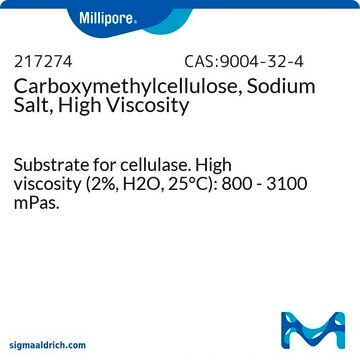419273
Sodium carboxymethyl cellulose
viscosity 50-200 cP , c=4% H2O at 25°C
Synonym(s):
Carboxymethylcellulose sodium salt
About This Item
Recommended Products
form
powder
autoignition temp.
698 °F
extent of labeling
0.7 carboxymethyl groups per anhydroglucose unit
viscosity
50-200 cP
mp
274 °C (dec.)
InChI
1S/C6H12O6.C2H4O2.Na/c7-1-3(9)5(11)6(12)4(10)2-8;1-2(3)4;/h1,3-6,8-12H,2H2;1H3,(H,3,4);
InChI key
DPXJVFZANSGRMM-UHFFFAOYSA-N
Looking for similar products? Visit Product Comparison Guide
General description
Application
Storage Class Code
11 - Combustible Solids
WGK
WGK 1
Flash Point(F)
Not applicable
Flash Point(C)
Not applicable
Personal Protective Equipment
Certificates of Analysis (COA)
Search for Certificates of Analysis (COA) by entering the products Lot/Batch Number. Lot and Batch Numbers can be found on a product’s label following the words ‘Lot’ or ‘Batch’.
Already Own This Product?
Find documentation for the products that you have recently purchased in the Document Library.
Customers Also Viewed
Our team of scientists has experience in all areas of research including Life Science, Material Science, Chemical Synthesis, Chromatography, Analytical and many others.
Contact Technical Service


